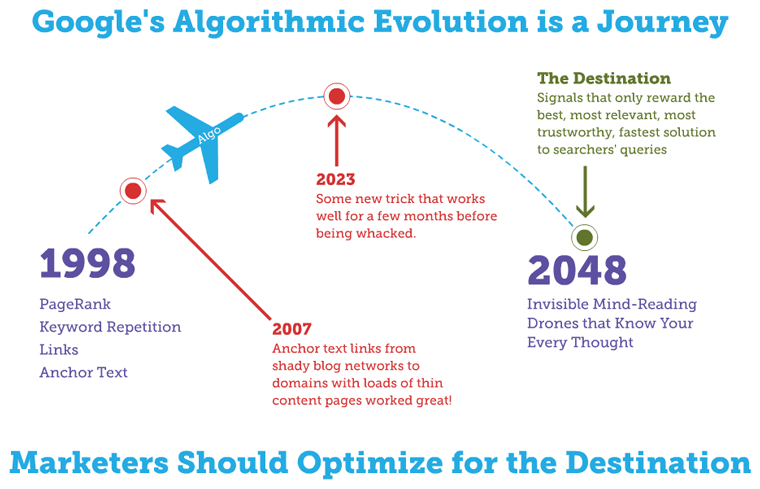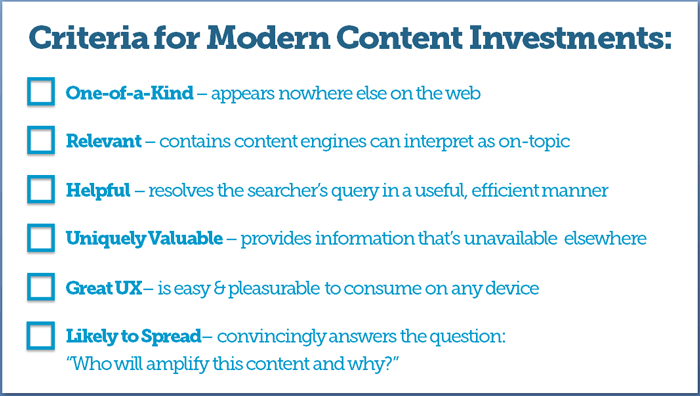This post is going to sound like clickbait to some, irrational to others, and probably sane to only a handful of practitioners, but I think it’s a frequent and important enough topic to put out there anyway. Almost every time I’m interviewed about SEO or asked about the practice at a conference, I’m asked “how can I keep up with SEO when the algorithms are changing all the time?” There are three assumptions inherent in this question that I want to challenge:
- Doing SEO well at any level requires keeping up with the day-to-day changes and minutiae
- Algorithm changes are the primary (and/or only) thing that changes SEO
- SEO practices are actually changing or need to change due to algorithmic updates
I think all three assumptions are false. Here’s why.
#1 – At the most tactical level of keyword research, content creation, site auditing, link building, and technical SEO, it could be argued that keeping up with SEO is essential to getting the most out of your work. However, most folks who interact with SEO aren’t doing all of those things all of the time. In fact, I’d wager that the vast majority of marketing and web professionals who interact with SEO do so tangentially – web developers who want to create sites and pages that follow best practices, marketing leaders who want to craft or execute an SEO strategy, copywriters and bloggers who need to create search-friendly content, public relations professionals trying to insure their contributions maximize SEO benefit, etc.
For these roles, having a solid grasp of SEO that’s a few months or even a year behind the very latest trends will rarely be harmful. Perhaps they’ll not realize that the Google+ authorship program has disappeared and maintain that markup. Or maybe they’ll ignore bad links pointing to their sites rather than disavowing them in Webmaster Tools. It can be hard to admit as someone who pays attention to the day-to-day changes of SEO and often feels like that world is in constant upheaval, but there are a lot of very successful sites following 4-5 year SEO best practices and doing remarkably well.
#2 – Yes, the algorithms that power rankings change all the time. But they are consistently going in a direction they’ve been headed in for nearly two decades. Google wants to return the best, most relevant, most trustworthy, fastest solution to searchers’ queries. Google’s definitions of “relevant,” “best,” and “most trustworthy” almost never change*. Thus, if you’re optimizing to the destination of the algorithms, rather than the specific point of the algorithms’ progress today, you’ll be close to maximizing your benefit while minimizing the need for extra work.

It’s a lot like how autopilot navigation systems work. At any given point in a given flight’s journey between, say, Seattle and Philadelphia, the plane is actually off-course. If it continued in that precise direction indefinitely, it would not reach Philadelphia, and would, instead, run out of fuel in Nova Scotia or Florida. But, through a series of tiny, frequent course corrections, the plane manages to get to Philly via a surprisingly optimal overall path. Google functions the same way – the little course corrections along the journey are myriad and many of them are fascinating** but if you’re optimizing for the eventual destination, your strategy is unlikely to require much updating as the course corrections manifest.
#3 – When SEO best practices do change, my experience has been that it often has much less to do with algorithmic changes and much more to do with changes in human behavior, particularly around how we use the web. The emergence of social media marketing as a major strategic component of SEO didn’t happen because Google suddenly started counting Facebook likes & shares. It happened because hundreds of millions of people started using Facebook as a major discovery, sharing, and interaction platform. Responsive and adaptive design for mobile didn’t come into being because Google biased their algorithm to reward mobile-friendly design. They became best practices because mobile adoption and use skyrocketed. Same with everything from content marketing to video to paid amplification through content syndication networks.
Some SEO practices really do change based on Google’s shifts. Keyword stuffing died out long ago because Google stopped rewarding it. Many forms of link acquisition, for example, have become far too risky to invest in because Google’s become so aggressive about penalizing sites that engage in these practices. But, I’d argue that this takes us back to point #2 above. If you were targeting Google’s destination, rather than their point in the journey, most of these algorithmic shifts didn’t affect your approach much, if at all.
—————-
Let me be totally clear – if you’re an SEO professional, it’s your job to keep up to date with the nuances, and to be able to understand and explain the micro-shifts occurring in the field. And, yes, Google and SEO do change all the time, but it’s those course corrections that are changing, not the destination***.
That’s why I think it’s both counter-intuitive and simultaneously sane to say that for most people who are not hardcore SEO professionals in the trenches, SEO isn’t changing from day to day or even week to week – at least, not in a way that requires their devout attention. Reading a roundup of news every week (e.g. Moz’s Top 10 or Searchcap) is something I’d still nudge you to do, but it might even be overkill depending on your role or needs.
Say you’re a small business owner who does a lot of marketing and customer acquisition via the web. Organic search sends between 40-70% of your web traffic. But SEO is only one small aspect of your overall workload.
In the scenario above, do you really need to know that…
- Penguin 3.0 is doing a slow, phased rollout (even though the early news was that the rollout was complete)?
- Google appears to be testing a version of the SERPs where search keywords aren’t bolded?
- Your Google Places Dashboard updates may have several days of delay when you make changes?
- Google+ has grown past 2 billion accounts, but that interactions between G+ and search have lessened?
- The Knowledge Graph keeps changing and adding/removing/testing features on various types of queries?
- Google is fighting propaganda attempts on very specific search phrases like “Is the Holocaust Real?“
If you are an SEO professional, you should be living and breathing this stuff. Those of us deep in the field sometimes can be early adopters of a process/tool/data source/platform/algo shift and benefit from knowledge of those micro-shifts. Hopefully, it’s not just your job, but your passion, and finding out new information about how search works, how social media platforms are changing, how the web ecosystem is changing fills you with a sense of learning and accomplishment. But, if you’re that small business owner, you can pretty well ignore those five things.
I’d take this even further.
If, in 2004, you balanced SEO best practices with usability/user experience needs and created a site with content that was optimal for people and engines, you probably had an SEO strategy that would still work today. You might need to make updates, especially with regards to your tactics for earning awareness (taking into account the rise of social networking), for optimizing to multiple devices (instead of just multiple browsers), and to keep your UI/UX enjoyable for modern users, but strategic-level SEO wouldn’t need nearly as much of a shift as these others.
Here’s a checklist I made a couple months ago, in August 2014, that featured in a recent presentation:

This same checklist could have been made in 1998 or 2004 or 2010. The words might have carried a slightly different meaning, but to me, the shocking part is how consistent our high-level, best practices have remained.
——————-
* One might argue that Google’s become more brand biased/domain-biased rather than the page-level-centric model they started with, but I’d counter that, if they’d had the technology, horsepower, and experience to pursue brand/domain-biasing in 1998, they’d have started out that way.
** And, yes, some of these course corrections actually take the algo more off-course, and as such, can be temporarily exploited.
*** The only potential caveat to this is the possible shift in Google’s destination from providing answers sourced from other sites to a willingness to provide the answers themselves. That strategy started only a few years after Google did (as early as 2003/4 from what I recall), but it was, arguably, slightly different than the prior destination.
